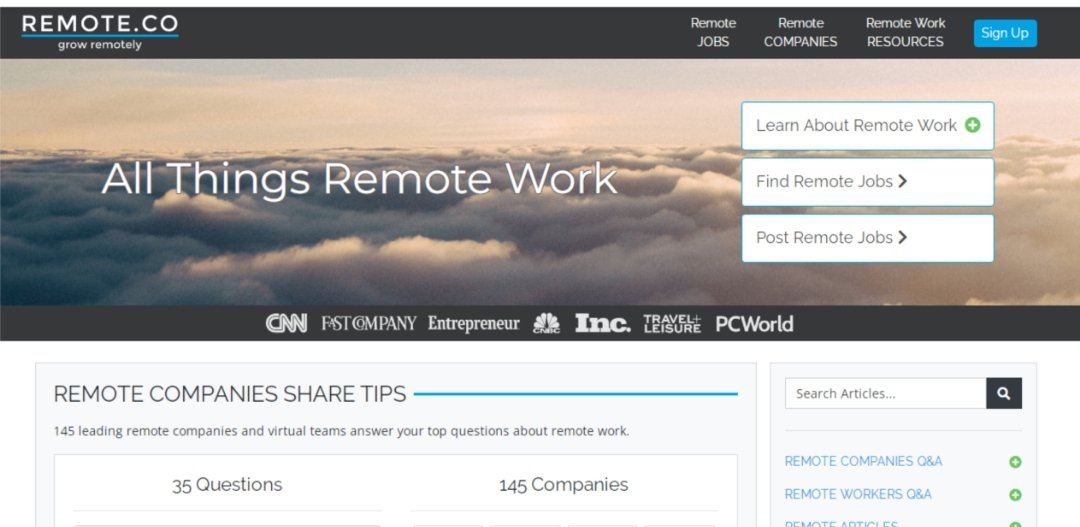Comparing Remote Work Platforms: Which One Is Right for You?
Remote work has been on the rise for years, thanks to technological advancements that have made it easier than ever to work from anywhere. With more and more companies embracing remote work to attract top talent and increase productivity, choosing the right platform to help you find the perfect job or gig is more important than ever. But with so many options out there, it can be overwhelming to know where to start.
That’s where I come in! I’ll compare top remote work platforms in this article, including FlexJobs, Remote.co, We Work Remotely, Upwork, Fiverr, and Hamtem. We’ll look closer at each platform’s offerings, including the types of jobs available, the industries they cater to, and how easy they are to use.
Whether you’re a seasoned remote worker or just starting, this article will give you the information you need to decide which platform is right for you. So grab a coffee, get comfortable, and let’s dive in!
Key Factors to Consider When Choosing a Remote Work Platform:
When it comes to finding the perfect remote work platform, there are a few key factors you’ll want to keep in mind. First and foremost, consider the types of jobs available on each platform.
Are you looking for a full-time gig or more interested in part-time or freelance work? Some platforms specialize in specific jobs, so finding one that aligns with your needs is essential.
Another factor to consider is the industries and skill sets each platform caters to. Some platforms, like Upwork and Fiverr, have many job categories, while others, like Hamtem, focus more on remote and hybrid positions. Consider your skills and experience, and look for a platform with plenty of remote jobs in your field.
It’s also worth looking into each platform’s screening process for job listings. After all, you want to ensure you’re applying for legitimate, high-quality jobs on platforms like FlexJobs and Remote. Co are known for their rigorous screening processes, which can give you peace of mind as you apply.
Ease of use is another crucial factor to consider. You don’t want to waste time navigating a clunky or confusing platform, so look for one with a user-friendly interface and intuitive search functions. And don’t forget to read user reviews to get a sense of other people’s experiences with each platform.
Finally, look into any pricing or fees associated with each platform. Some, like Upwork and Fiverr, take a percentage of your earnings as a fee, while others, like FlexJobs, charge a monthly subscription fee. Consider your budget and how much you’re willing to invest in your remote job search when deciding.
By keeping these key factors in mind, you’ll be well on your way to finding the perfect remote work platform for your needs. But don’t just take our word for it—let’s take a closer look at each platform and see how they compare!
Read: Finding Flexibility? These Remote Jobs Let You Work From Anywhere (Hiring!)
Platform Comparison
Now that we’ve covered the key factors to consider when choosing a remote work platform let’s take a closer look and compare some of our top options. We’ll be taking a closer look at FlexJobs, Remote.co, We Work Remotely, Upwork, Fiverr, and Hamtem, highlighting each platform’s unique features and benefits. Whether you’re a seasoned remote worker or just starting, this comparison will give you a better sense of which platform might best fit your needs and goals. So grab a notepad, and let’s get started!
5. FlexJobs
Let’s take a look at FlexJobs. This platform is known for its extensive database of remote and flexible job listings spanning various industries. One of the standout features of FlexJobs is its rigorous screening process – every job listing is vetted by its team to ensure it’s legitimate and high-quality. This can save you much time and hassle in your job search.

When it comes to the types of jobs available, FlexJobs has something for everyone. Whether you’re looking for a full-time remote job, a part-time gig, or freelance work, you’ll find plenty of options here. They even have a section dedicated to entry-level remote jobs, which can be a great option if you’re starting.
Of course, no platform is perfect, and FlexJobs is no exception. One potential downside is the monthly subscription fee of $24.95—while it’s relatively low, it can add up over time. However, many users find that the quality of the job listings and the time saved in their job search are well worth the cost.
FlexJobs also offers a 14-day trial for $2.95, an excellent way to test the service before committing to a monthly plan.
Flexjobs Pros:
- Extensive database of remote and flexible jobs
- Rigorous screening process for job listings
- Wide range of industries and job types
- A dedicated section for entry-level remote jobs
Flexjobs Cons:
- A monthly subscription fee is required
- Some job listings may be outdated or already filled
4. Remote.co
Next, let’s take a closer look at Remote. Co. This platform connects remote job seekers with fully remote companies or offers remote job positions. One of the unique features of Remote is its emphasis on company culture and values. It provides in-depth profiles of each company to help you understand whether it’s a good fit for you.
 Regarding the types of jobs available, Remote. Co focuses primarily on full-time remote positions, although they also have some part-time and freelance options. They cover various industries, from tech and marketing to customer service and education.
Regarding the types of jobs available, Remote. Co focuses primarily on full-time remote positions, although they also have some part-time and freelance options. They cover various industries, from tech and marketing to customer service and education.
One potential downside of Remote. Co is that its job listings aren’t always as up-to-date as other platforms. However, it does offer a helpful newsletter that delivers new job listings straight to your inbox so you can stay on top of the latest opportunities.
Pros:
- Emphasis on company culture and values
- In-depth company profiles available
- A wide range of industries covered
- Newsletter delivers new job listings to your inbox
Cons:
- Primarily focused on full-time remote positions
- Job listings may not always be up-to-date.
Read: They Don’t Want You to Know About These High-Paying Overnight Remote Jobs
3. We Work Remotely
If you’re looking for a platform with a truly global reach, We Work Remotely is worth checking out. This platform connects remote job seekers with companies worldwide across various industries and remote job types. One of the standout features of We Work Remotely is its user-friendly interface—it’s easy to search for jobs by keyword, category, or location, and you can even set up email alerts for new listings that match your criteria.
We Work Remotely also strongly emphasizes diversity and inclusion, with a dedicated section for job listings from companies prioritizing these values. This can be a great way to find an employer aligning with your values and goals.
Pros:
- Global reach and diversity of job listings
- User-friendly interface with email alerts
- A dedicated section for diversity and inclusion
- Wide range of industries and job types
Cons:
- High competition for jobs due to global reach
- Some job listings may be outdated or already filled
2. Upwork
If you’re a freelancer looking for remote work, Upwork is a platform worth considering. This freelance marketplace connects businesses with skilled professionals across various industries, from writing and graphic design to web development and marketing. One of Upwork’s key features is its robust search and filtering options—you can search for jobs by keyword, category, skill level, and more and even set up custom searches to find the perfect gig.

Upwork also offers a range of tools and features to help freelancers manage their work and get paid, including time tracking, invoicing, and payment protection. However, it’s worth noting that Upwork does take a percentage of your earnings as a fee, which can add up over time.
Pros:
- Robust search and filtering options for finding gigs
- Wide range of industries and skill levels
- Tools for managing work and getting paid
- Large client base and potential for ongoing work
Cons:
- Upwork takes a percentage of earnings as a fee
- High competition for some gigs
- Some clients may have unrealistic expectations or low budgets
1. JobsThatAreRemote.com

Finally, let’s look at Jobs That Are Remote, a platform focusing on remote and hybrid job listings. One of the standout features of jobsThatAreRemote is its emphasis on employer branding—companies can create detailed profiles and showcase their culture, values, and benefits to attract top talent.
JobsThatAreRemote also offers job seekers a range of tools and resources, including a blog with tips and advice for remote work and a community forum to connect with other professionals.
Read: Remote HR Hacks for Busy Professionals (Without Sacrificing Sleep!)
Pros:
- Specific focus on remote and hybrid job listings
- Emphasis on employer branding and company culture
- Tools and resources for job seekers, including blog and community forum
- User-friendly interface and search options
Cons:
- A smaller selection of job listings compared to some other platforms
- Some employers may not have fully fleshed-out profiles or job listings
Overall, each platform has unique features and benefits, and the right choice for you will depend on your specific needs, skills, and goals as a remote job seeker or freelancer. By considering the key factors we discussed earlier and weighing the pros and cons of each platform, you’ll be well on your way to finding the perfect remote work opportunity.






